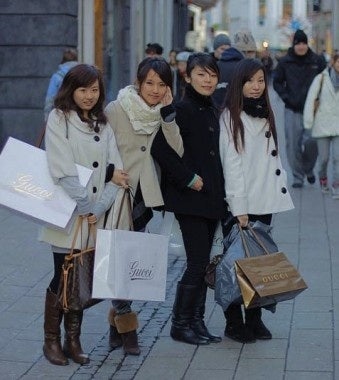Company Plans To Invest Most Heavily In Asia-Pacific Region, With Particular Eye On China, In 2010#

The last decade has been good for Gucci in China, with the company going from a handful of boutiques in top-tier cities in 2000 to 30 locations in more than 20 cities today. Expansion has sped up in the last five years, with store locations popping up in second-and third-tier markets like Changchun, Wuhan and Shijiazhuang-- cities that may be little known outside of China but have growing ranks of new wealthy with a strong appetite for luxury goods.
While this expansion has benefited the Gucci brand specifically, it has also been good for its parent company the Gucci Group, which owns companies like Yves St Laurent and Bottega Veneta. As Jing Daily pointed out last month, the growth of the Gucci brand, specifically, appears to follow the same roadmap employed by the Gucci Group for its other brands in the China market, such as Bottega Veneta, which recently opened its first second-tier city location in Nanjing.
Building on the Gucci Group's success in recent years in the Asia-Pacific region, powered by the new "backbone" of the luxury industry, China, the company's CEO said in an interview that Gucci's investment in the Asia-Pacific region -- most of which will go towards China -- will make up "the lion's share" of investment in 2010. Other emerging markets in places like Latin America will also see more expansion, but with China, Hong Kong and Macau accounting for $4.72 billion in sales in 2008, China will likely stay the Gucci Group's bread and butter in the near- to medium-term.
[Robert Polet, chief executive of Gucci Group] said more than 60 per cent of Gucci Group investment was aimed at expansion in Asia, particularly China. Mr Polet said it was clear to him when he joined the group in 2004 that “Asia Pacific was going to be the big prize to be taken”.
He has since increased the number of Gucci stores in China from four to 30. “We have more selling square footage in mainland China built in five years than we built up in 30 years in Japan. This strategy has proven to be correct and will remain like this,” he said.
Though Gucci's expansion in China is nothing short of impressive, it's important to keep in mind that Chinese luxury consumers -- especially at the highest end -- are highly sensitive to brand dilution, and Gucci risks losing their interest to more "boutique" brands like Chanel if Gucci becomes too ubiquitous in China. Many would say that some of the Gucci Group's brands already have become oversaturated in China, and that the group needs to think less about store openings and more about catering to loyal, wealthy customers in Beijing and Shanghai. These regular buyers may be loyal, but their loyalty is highly dependent on their ability to set themselves apart from the pack by swathing themselves in Gucci products.
As exclusivity plummets and individuals in second- and third-tier cities stock up on Gucci products, the company risks a serious backlash in key markets. It will be interesting to see how the Gucci Group intends to stave off or remedy this possibility in the next couple of years.